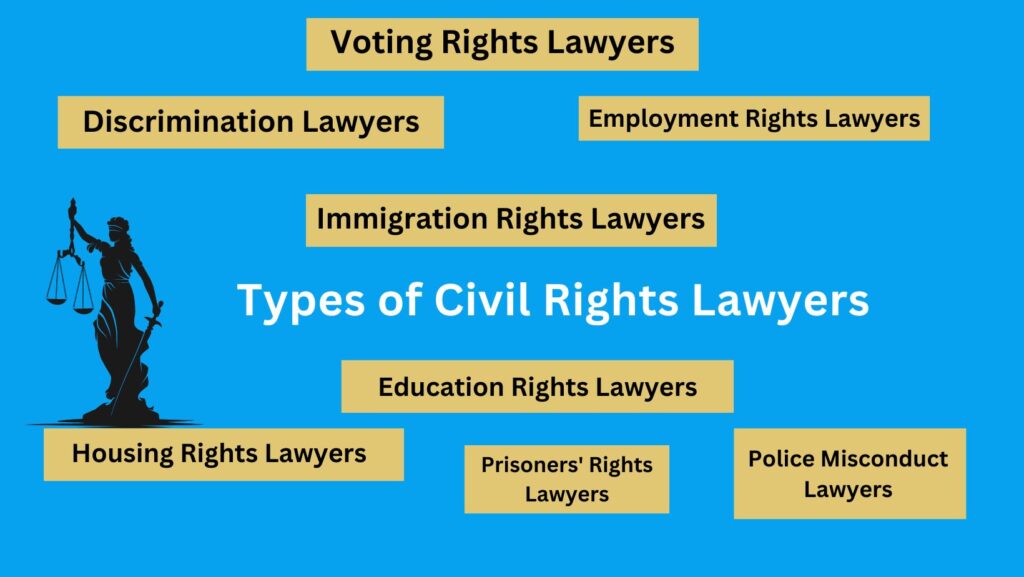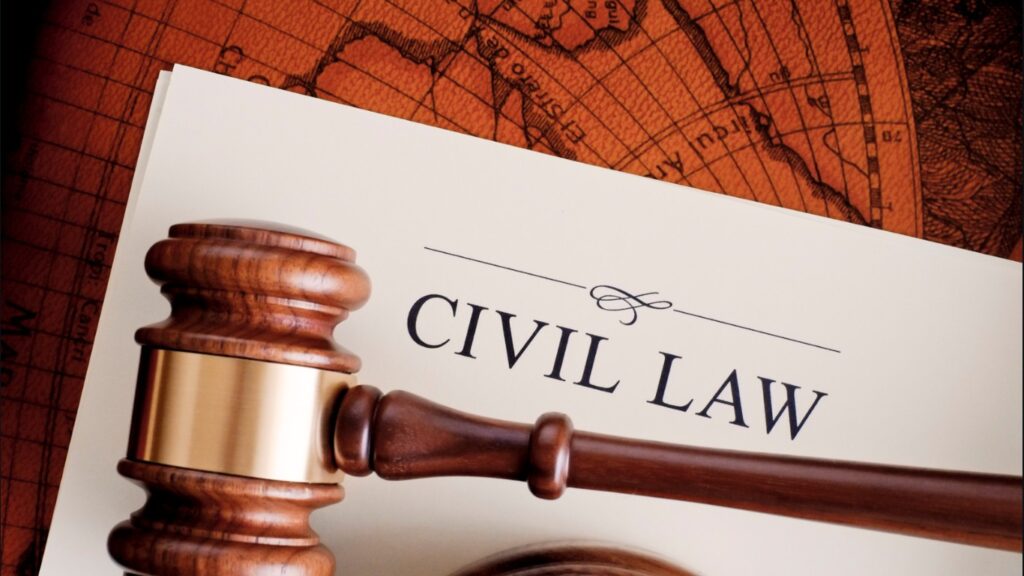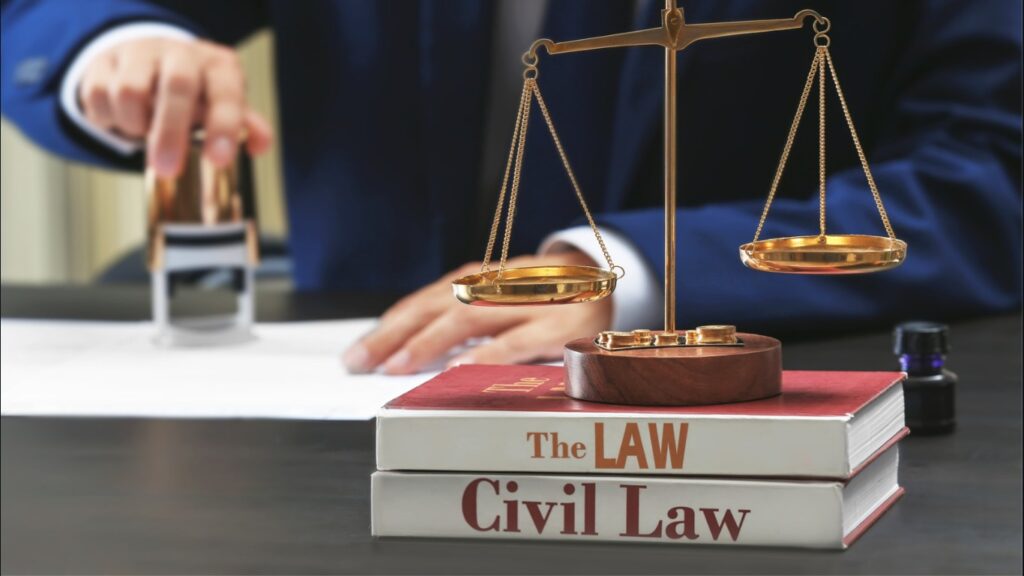Civil rights lawyer is a legal professional who specializes in the protection and expansion of people’s civil rights and civil liberties. These rights are often granted by the U.S. Constitution and other legislation, and include issues such as human rights, social freedoms, and equality. Civil rights lawyers handle cases involving discrimination, freedom of speech, voting rights, and other significant matters concerning individual rights and liberties.
What is Civil Rights?
Civil rights are an essential part of any democratic society, ensuring that all individuals are treated fairly and equally under the law. Protection of civil rights requires the dedication and advocacy of professionals known as civil rights lawyers. To shed light on the vital work performed by civil rights lawyers and answer frequently asked questions related to their role.
What Does a Civil Rights Lawyer Do?
Civil rights lawyer specializes in protecting the fundamental rights and liberties guaranteed to individuals by law. Role in defending against discrimination, promoting equality, and fighting for justice. Civil rights lawyers handle a wide range of legal issues related to individual freedoms, which may include:
- Discrimination Cases: Civil rights lawyers work to combat discrimination based on race, gender, religion, age, disability, or any other protected characteristic. They provide legal representation to victims who have experienced discrimination in areas such as employment, housing, education, and public accommodation.
- Police Misconduct: Civil rights lawyers are involved in addressing cases of police misconduct, excessive force, wrongful arrest, or violations of constitutional rights such as unlawful searches and seizures. They advocate for accountability and justice for individuals whose rights have been violated by law enforcement.
- First Amendment Rights: Lawyers specializing in civil rights also defend freedom of speech, religion, press, assembly, and petition. They may take on cases involving censorship, restrictions on public expression, or violations of religious freedoms.
- Voting Rights: Civil rights lawyers play an important role in protecting citizens’ voting rights by challenging discriminatory voter laws, advocating for fair elections, and fighting against any form of voter suppression.
- Educational Equality: These lawyers actively work to ensure equal access to education and combat discrimination in schools, colleges, and universities. They may address issues such as racial segregation, unequal funding, inadequate special education services, or discriminatory disciplinary practices.
- Advocacy and Lobbying: Civil rights lawyers often engage in advocacy and lobbying efforts to influence legislation, policies, and regulations that can impact civil rights. They work with organizations and government entities to propose and shape reforms that promote equality and protect individual rights.
Types of Civil Rights Lawyers
Civil rights lawyers can specialize in a variety of areas, each focusing on different aspects of civil rights law. Types of civil rights lawyers:

- Discrimination Lawyers: Specialize in cases where individuals have been discriminated against based on race, gender, age, religion, disability, or sexual orientation.
- Employment Rights Lawyers: Lawyers handle cases involving workplace discrimination, wrongful termination, and other employment-related issues.
- Housing Rights Lawyers: They focus on issues related to housing discrimination, tenant rights, and fair housing laws.
- Education Rights Lawyers: These attorneys deal with cases involving discrimination in educational settings and advocate for equal access to educational opportunities.
- Voting Rights Lawyers: They work to protect the right to vote and address instances of voter suppression or gerrymandering.
- Disability Rights Lawyers: These lawyers advocate for the rights of individuals with disabilities, ensuring compliance with the Americans with Disabilities Act and other related laws.
- LGBTQ+ Rights Lawyers: They specialize in cases that involve discrimination against LGBTQ+ individuals and fight for equal rights in various aspects of life.
- Prisoners’ Rights Lawyers: These attorneys work on behalf of inmates to address issues such as inhumane treatment, wrongful imprisonment, and access to fair legal representation.
- Immigration Rights Lawyers: They assist individuals with immigration-related civil rights issues, such as asylum, deportation defense, and discrimination based on nationality.
- Police Misconduct Lawyers: Lawyers handle cases involving police brutality, unlawful searches and seizures, and other forms of misconduct by law enforcement officers.
What Skills Does a Civil Rights Lawyer Require?
Civil rights lawyer requires a diverse set of skills to effectively advocate for their clients and navigate the complexities of civil rights law. Key skills that are essential for a civil rights lawyer:
- Active Listening: Understand the concerns and objectives of their clients and witnesses.
- Analytical Reasoning: Evaluate case facts and apply legal principles accurately.
- Communication: Proficient in both oral and written forms to argue cases and draft legal documents.
- Critical Thinking: Develop strategies and solve problems creatively.
- Empathy: Relate to clients and understand the impact of civil rights issues on their lives.
- Networking: Build relationships with other legal professionals, organizations, and potential clients.
- Research Skills: Find relevant case laws, statutes, and legal precedents.
- Persuasive Writing: Craft compelling legal briefs and motions.
- Public Speaking: Effectively present cases in court and public forums.
Role of a Civil Rights Lawyer
Civil lawyer is responsible for providing necessary support to clients on non-criminal matters of dispute in the family, business, property, and other litigation matters. He or she helps clients to save their legal rights and represents them in court.
When do you Need a Civil Rights Lawyer?
When your fundamental rights are compromised, seeking the counsel of a civil rights lawyer is a decisive step towards justice. These legal professionals are adept at addressing issues where you’ve been wronged due to aspects such as race, religion, gender, or disability.
They are particularly major in situations where you’ve been subjected to actions like unwarranted searches and seizures, which infringe upon your legally protected freedoms. With their expertise, they work diligently to ensure that your rights are recognized and upheld, providing a shield against any form of unjust treatment and advocating for the restitution you deserve. Their role is useful in not just rectifying wrongs but also in Protect the very principles of equity and fairness.
What are the Common Civil Rights Violations?
Civil rights violations are violations of the legal standards set to protect individual freedoms and equality. These transgressions can manifest in various forms, often impacting the most fundamental aspects of daily life.

- Employment Discrimination: When people are treated unfairly at work because of who they are.
- Hate Crimes: When someone is hurt or threatened because of hate towards their group.
- Police Misconduct: When officers use too much force or misuse their power.
- Housing Discrimination: When people are denied a place to live because of their identity.
- Educational Discrimination: When students don’t get the same chances in school due to their background.
How much does a civil rights attorney cost?
The cost of hiring a civil rights attorney can vary widely based on several factors, including the complexity of the case, the experience of the attorney, and the fee arrangement. Typically, many civil rights lawyers work on a contingency fee basis , meaning they only get paid if you win your case. In such arrangements, the attorney’s fees might be a percentage of the settlement amount, often ranging from 33% to 40%.
For example, if you were to win a civil rights case with a settlement of $100,000, and your attorney’s contingency fee is 35%, the attorney’s fee would be $35,000. Clients might be responsible for certain costs such as court filing fees or other expenses, which are usually advanced by the law firm and reimbursed from the settlement.
In cases where attorneys charge by the hour, rates can range between $200 and $500 per hour. The total cost will depend on how many hours the attorney works on your case. For a case that takes 10 hours of work at $300 per hour, the cost would be $3,000.
It’s important to discuss all fee arrangements and potential costs with your attorney upfront to have a clear understanding of the financial commitments involved in pursuing your civil rights case.
Frequently Asked Questions:
How can I become a civil rights lawyer?
Becoming a civil rights lawyer typically involves obtaining a bachelor’s degree, followed by completing a Juris Doctor (J.D.) degree from an accredited law school. After graduation, passing the bar exam is necessary to obtain a license to practice law.
Are civil rights lawyers only for high-profile cases?
No, civil rights lawyers work on cases of various magnitudes. They provide legal support to individuals who have experienced discrimination at any level and are dedicated to ensuring justice and equality for all.
How much do civil rights lawyers charge for their services?
Fees charged by civil rights lawyers can vary depending on factors such as the complexity of the case, the attorney’s experience, and the geographic location. Some lawyers may provide services on a contingency basis, meaning they only get paid if the case is successful, while others charge hourly rates or fixed fees.
How long does it take to resolve a civil rights case?
Duration of a civil rights case varies widely. It can be resolved through negotiation and settlement or proceed to trial, which may extend the timeline significantly. The complexity of the case, the court’s schedule, and the parties involved all contribute to the duration of the legal process.
Also Read:
How Do Pro Bono Lawyers Get Paid?
Civil rights lawyers are at the forefront of protecting and advocating for justice, equality, and individual freedoms. They represent an essential pillar in maintaining the integrity of our societal values. By understanding the role they play and the range of issues they address, we can better appreciate the significance of their work in preserving civil liberties for all.






